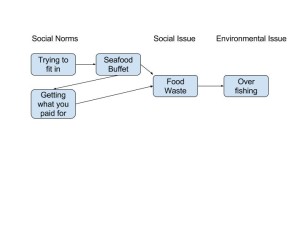- One experience I have had in dealing with social norms and food choice was at a seafood buffet in Maryland. I really dislike most types of seafood, but I was with my girlfriend’s family. One of their main goals on this vacation was to eat at this particular restaurant. It was about $30 per person, and they paid for me to enter. After such a high price I felt pressured to at least try a large variety of foods. I did not enjoy any of it, and out of six full plates I wasted about 3/4 of the food. I felt terrible for wasting it, but they assured me that it was fine, because we were at a buffet and people wasted food all the time, and we essentially paid for the food anyway, so it didn’t really matter.
- This leads to a social issue of food waste, which in turn causes environmental issues. The food that I personally wasted, and the food that other people consistently waste leads to an abundance of over-fishing. I was overwhelmed by the high price to try as much food as I could and “get my monies worth” but at the expense of wasting food. Even though I wasn’t paying any additional money, I was paying for it in environmental costs. After my terrible experience I ended up just going to McDonald’s and eating very cheap food, which was essentially wasteful because I had already had so much other food. The social norm should be if you don’t like food, don’t get it instead of trying to “get your monies worth.”

Food Choice and Social Norms – Hollabaugh
Status
3
